Sophomore Joseph Mutagaya explores the complexity of his character in the CVHS production of Mr. Burns, A Post-Electric Play
Photo Courtesy of Carnegie Theatre Company
Sophomore Joseph Mutagaya will play the character Gibson in Carnegie Vanguard Theater’s production of Mr. Burns opening November 10.
It sounds like a choir. The voices reverberate across the room. Harmonious. The voice guiding these vocal warm-ups is meditative, coaxing the relaxation of muscles. Hands raise towards the ceiling. The choir lifts up an object. For some, water bottles. For others, shoes. All improvisational stretching equipment. Reminiscent of a spiritual ceremony, the sounds and movements give an air of tranquility. Starting the Carnegie actors’ weekday rehearsals, vocal warm-ups are done for 20 minutes, loosening the body’s muscles and strengthening the voice.
Following vocal warm-ups are stretches, intended to prepare the actors for the dancing required in Mr. Burns, A Post-Electric Play, which is set to have opening night on November 10th. Playing the role of Gibson, this is not Sophomore Joseph Mutagaya’s first theater production. Although he is a new face in Carnegie’s Theater Department, he displayed interest in theater from a young age, as early as elementary school.
“I mainly became interested in theater because I had always loved movies. I had always loved acting. And I thought it would be interesting if I could try out and see if I could do it just for fun, maybe do it for an extracurricular,” said Mutagaya.
When he was younger, Mutagaya initially looked to acting for enjoyment. As he matured, his perspective on the art of acting developed as well. It has now become more in-depth and introspective, something Mutagaya holds in high regard.
“I love reading scripts and going through different characters, so personally, the reason why I got into acting was because it allowed me to show a part of myself, be expressive, and show how I feel,” Mutagaya said.
Although he has previous experience, this play is not something Mutagaya is accustomed to. His first play, Charlie and the Chocolate Factory, was more whimsical and lighthearted.
“I first became interested in theater around fourth grade. There was an ad in a local newspaper talking about the Mainstreet Theater. They were doing a local production with some kids, Willy Wonka and the Chocolate Factory. I auditioned and I was called back. I got the part of Augustus,” said Mutagaya.
This experience gave Mutagaya the opportunity to become familiar with the essentials of theater. To contrast his early experience, Carnegie’s Theater Department is more meticulous, given the older age range of the actors and technicians. The lights above the stage. The Green Room, home to special effects makeup, props, and costumes on pale mannequins. The stage with its heavy, red velvet curtains. The soundboard overlooking the audience. Carnegie is more equipped than Joseph’s first production, from special effects to stage design. Despite what some may assume, this still gave an opportunity for the children’s creativity to blossom.
“When we were doing Charlie and the Chocolate Factory, of course, there’s a famous scene where Augustus falls into a river. We couldn’t build a river in the theater, because it was a black box and on all sides, it was the audience, so we constructed a strip of cloth. I had to practice jumping under the cloth and then wriggling under the cloth and running backstage, where I would change into an Oompa Loompa. We didn’t have enough kids to play Oompa Loompas, so Augustus turned into an Oompa Loompa.”
Despite his main experience in plays that entail our childhood nostalgia, he is looking forward to the upcoming Mr. Burns, A Post-Electric Play. Inspired by Greek theater, this play gives the cast the opportunity to explore complex and serious subject matters and roles.
“There’s not going to be that much stuff in terms of technical things. There’s not a lot of lights, not a lot of effects, and so forth. It’s a very raw play. Certainly, it’s very emotional, and there’s a lot of difficult topics that are covered in the play. There’s a lot of interesting plot lines and storylines that we’ve been discovering. And overall, I would describe it as an analysis of the American psyche. It’s just a discussion and a reconsideration of what makes us Americans, not necessarily in a patriotic nature, but more in our culture, in how we behave, and in more intimate things like relationships and friendships,” said Mutagaya.
The intricacy of the play gives Mutagaya the avenue for self-expression he was looking for. CVHS theater director Steward Savage told Mutagaya’s Theater I class about the upcoming auditions for Mr. Burns, sparking Mutagaya’s interest. Showing enthusiasm to play a role in Mr. Burns, his path to auditioning was not met without minor hiccups, now comedic in hindsight.
“I showed up to auditions, but I came through the front door, which was locked. I waited for about 10-15 minutes, and I couldn’t get in, so I hopped in the car and went home. The next day, my dad had been telling me to go back and tell the teacher I missed the auditions, and I was feeling nervous. Then I was just thinking about it. My friends asked me if I had auditioned, and I told them I hadn’t because I couldn’t get into the school, and they encouraged me to do it. So I went and asked him [Mr. Savage] if I could do it, and I came for call-backs. We did a bunch of exercises, acting, bunch of different plays. I remember we did a particular scene with my character that was very emotional, and I feel like, personally, that was the moment when I feel like I became better for the role, because I really got into the character.”
Mr. Burns is a play that tells the story of several elaborate characters, such as Gibson, through seeing how they react in an apocalyptic setting. At the audition, Mutagaya was complimented by a fellow student on his execution of Gibson. This role is a complex, yet sensible, character that many students at Carnegie could possibly relate to, even Joseph himself.
“Gibson is kind of an interesting character. With this play, it’s going to seem like Gibson doesn’t belong in this kind of play, because it is a very raw play, a difficult play in some parts. Gibson is a very soft guy. He is more of the average Carnegie student. He holds his grades very important. He is sort of the guy who did a sport and also did good in school, and that was his college application. Gibson is the kind of character who likes busting out facts, and so on and so forth. He is the kind of character that changes a lot over the course of this play because he is able to change according to how he is impacting the other people around him… Gibson is adaptable. I think that is the best way I would describe him is that he changes based on the situation. He is a very interesting character because in some ways I would say he is stubborn, but I think it’s the relationships that get him through this [the apocalypse] and change him as a person.”
Although Joseph relates to Gibson in certain ways, being cast as Gibson was something unexpected for him.
“When I first auditioned, I thought I was going to do Matt, because I read a few of the lines and thought I did better as Matt than Gibson,” Mutagaya continued. “Matt is a very, very high-energy character. He is a very outgoing character, very excitable. He loves being the funny guy of the group, whereas Gibson I think would be more like me. Now reading more into him and reading the script more, I realize Gibson is more like me as a person because he is more reserved at first. He loves talking about things. He is very curious-, but he is very adaptable.”
Gibson, much like the other characters in the play, has multiple layers that need to be dissected. Such analysis and proper execution require feedback, which can be especially helpful to those who do not have as much experience in theater, easing doubts and allowing actors to connect with their roles.
“We have a lot of people from my class, which is Theater I, that has a lot of freshmen and sophomores participating. Personally, this is my first time acting in a very long time, since about sixth grade, so I think it’s great we are getting an opportunity to show our skills even though we are not as experienced as the Seniors. Savage, the seniors, and all the others who have done productions last year have been really supportive. They help us and they try to be as receptive and as open with their questions and communication as possible. That’s really helped us work on the production.”
This dynamic of open communication and feedback, supplemented with guidance from experienced members, allows Mutagaya to expand his horizons. From becoming more immersed in the character to thinking outside of the box, participating in Mr. Burns has allowed Mutagaya to push his limits as an actor.
“Sometimes, you want to stay in your comfort zone. Sometimes, I like to stay in my comfort zone. I think that’s my main problem. I want to avoid going out there because of how I’m afraid of how I’m going to be judged, but I feel at some point you have to put the character and how they act in front of your head and realize that, in that context, in that situation, not only how that character but how you would react in the same way.”
Theater. To Mutagaya, it’s a word that not only means an art but also a community. Something that fosters relationships. Something that provides a network full of people seeking to express their individuality, either through acting or the other factors that serve as the foundation and dazzling visuals of the production. It’s a word that means friendship.
“It helped me be able to make friends more easily and talk to people more easily because I am a pretty shy, sensitive person. I think being forced to be more professional, more social was really helpful with getting back into that routine from pre-quarantine, like socializing and making friends. It’s something that not only helps with having friends outside the program and in my classes, but it’s also about making friends beyond that.”
Your donation will support the student journalists of Carnegie Vanguard High School. Your contribution will allow us to cover our annual website hosting costs and fund field trips, competition fees, and equipment. We appreciate your support!
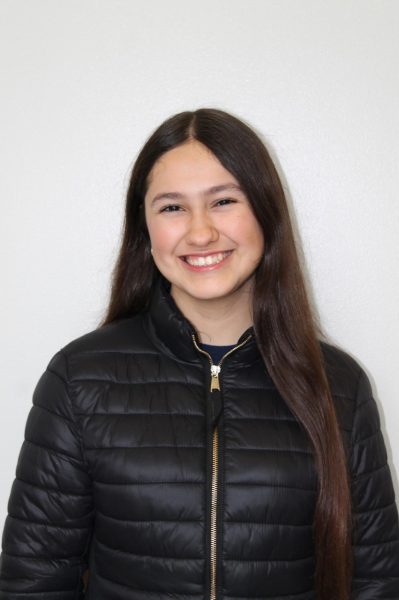
Sasha Cabral is a senior at CVHS. A musician and an artist, she imbues everything she does with creativity. She loves rock music, the colors red, black...

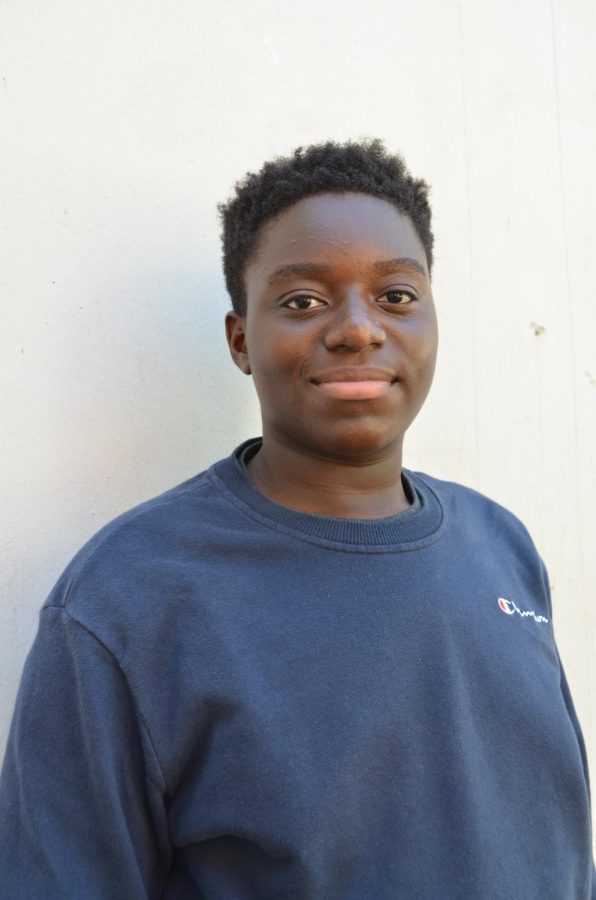
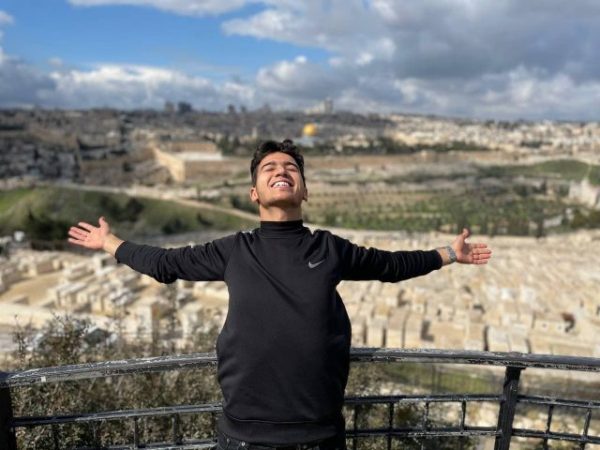
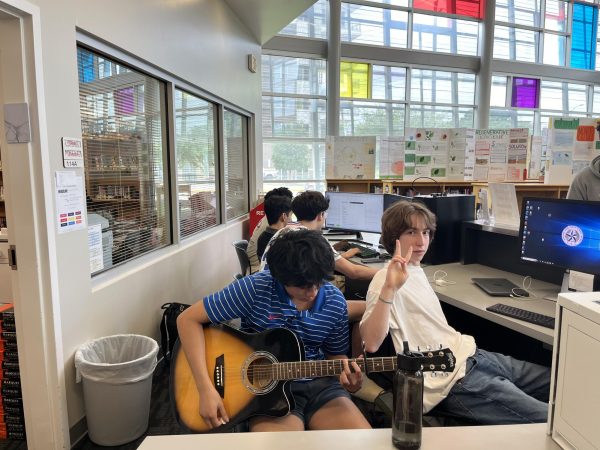
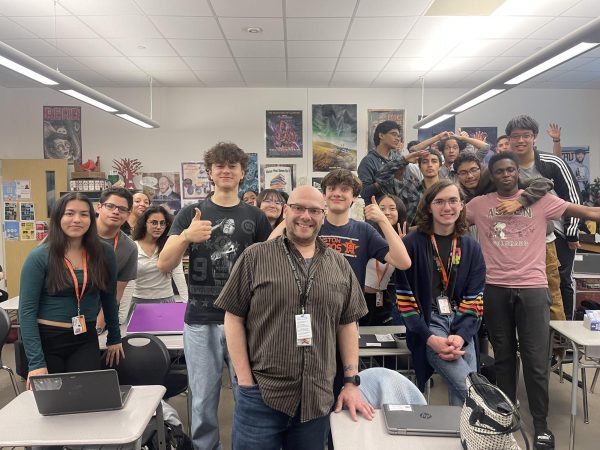

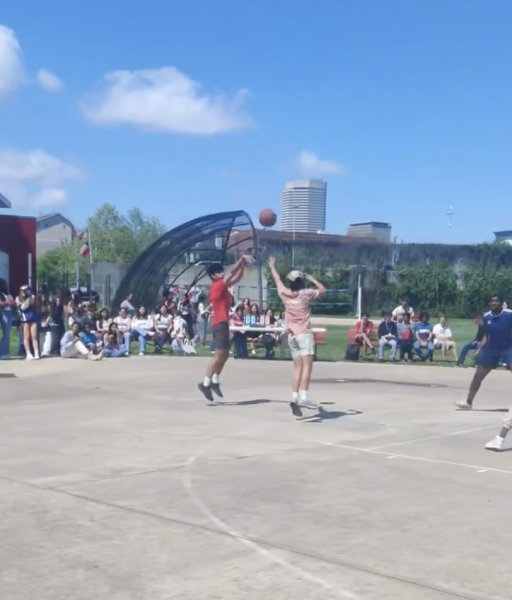
Nour Chibani • Oct 22, 2021 at 9:51 pm
I really enjoyed the descriptive language in the beginning. It really made me interested in reading the rest of the article!
vivian • Oct 22, 2021 at 5:10 pm
I loved your introduction!
Esha Sharma • Oct 22, 2021 at 2:07 pm
It was very interesting how you chose to begin the article with a vocal exercise that theater practices. The transition from the beginning to the first quote is seamless.
Abigail Nunez • Oct 22, 2021 at 2:05 pm
I really liked this story , I liked how Josephs thoughts throughout the process are implemented .
Danielle Yampuler • Oct 22, 2021 at 2:04 pm
You make the theater department sounds so interesting! I loved learning about him.
Sasha Cabral • Oct 22, 2021 at 2:13 pm
Thank you so much!
Ankitha Lavi • Oct 22, 2021 at 2:02 pm
As someone who doesn’t know much about theatre, this is so insightful on what goes on behind the scenes for the main character!
Roxell • Oct 22, 2021 at 1:58 pm
I loved this story! I can’t wait to watch it! Awesome Job.
Imran Hanif • Oct 22, 2021 at 1:56 pm
I absolutely loved the transition right before the first quote. It really sparked an interest for the rest of the article.
Sasha Cabral • Oct 22, 2021 at 2:13 pm
Thank you. I appreciate it!
MyTran Vo • Oct 22, 2021 at 1:55 pm
I liked how you added parts of his childhood and his experiences in acting from a young age. The quotes were really memorable and it was very well written
hannah mansour • Oct 22, 2021 at 1:54 pm
I like how u connected and highlighted similarities between the actor and the character.